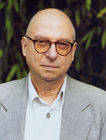ORFEO International – Reviews
Important Releases Briefly Introduced
February 2006
ORFEO 1 CD C 663 061 A
What are the necessary conditions, what gifts, what stubbornness and even what element of chance are required for a man like Aribert Reimann to realize his greatest potential? In the light of his life’s work as a composer, this question far from unjustified.
On the Orfeo label, Aribert Reimann, who celebrated his seventieth birthday on 4 March 2006, is not only familiar as a composer and as a sympathetic and long-standing accompanist of Dietrich Fischer-Dieskau, but he has also set new standards as the editor of the label’s series of releases devoted to contemporary lieder.
The reissue of 
Reimann’s early song cycles that were recorded in Berlin between 1968 and 1981 provides a preliminary answer to the hypothetical question whether and in what way it is still possible to write poetry after 1945 and, if so, how it should be set to music. Not least as a result of the different poems on which they are based, Reimann’s lieder make it perfectly plain that the musical form of the song is repeatedly reinvented and varied according to rules of its own. Although it draws its inspiration from various schools such as serial music, its self-imposed rules are repeatedly broken in the interests of musical unity, their application extended in order to achieve the greatest possible increase in expressivity. With his Nachtstücke to texts by Joseph von Eichendorff and his settings of more modern verse by Paul Celan and Sylvia Plath, Reimann has shown that the vitality of the lied as a genre rests on texts from various periods and that musical contemporaneity does not necessarily demand literary contemporaneity. Previous releases in Orfeo’s series devoted to contemporary lieder have already made this clear: think only of Hanns Eisler’s songs to poems by Matthias Claudius, Friedrich Hölderlin and Christian Morgenstern, Wolfgang Fortner’s Shakespeare Songs and Hermann Reutter’s Chamber Music to words by James Joyce, a piece which, like 
Aribert Reimann
Foto: ORFEO InternationalReimann’s own setting of Six Poems by Sylvia Plath, reflects the interest in the English idiom felt by composers whose native language is German. The equal partnership between interpreters, singers and accompanists is the fundamental precondition for lieder singing – and not just in the case of Reimann, who has defined and sustained Orfeo’s contemporary lieder edition. Together with Axel Bauni, Reimann has also helped in no small way to shape the series as an accompanist. The singers who to date have placed their skills in the service of this series belong to different generations, but they are all distinguished by their huge stylistic range and flexibility. Suffice it to name Catherine Gayer, Ernst Haefliger and Barry McDaniel, all of whom may be heard on the new CD accompanied by Aribert Reimann. Earlier releases have featured Juliane Banse, Christine Schäfer, Stella Doufexis, Doris Soffel, Christoph Prégardien, Dietrich Henschel, Thomas Quasthoff and Dietrich Fischer-Dieskau.
top |